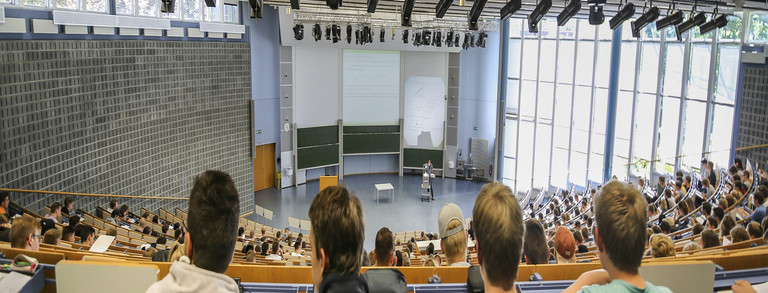Process Systems Engineering
Summary
| Degree | Master of Science (M.Sc.) |
|---|---|
| Subject group | Engineering Sciences |
| Standard program duration | 3 semesters |
| Admission requirements |
none
|
| Start of studies |
Winter semester
|
| Language | English |
| Enrollment requirements | |
| Further information | Website of Department of Biochemical and Chemical Engineering |
Overview
It is a wellplanned course in which students will not be studying core chemical engineering subjects such as thermodynamics, mass transfer, and heat transfer once again. Instead students will have the opportunity to learn subjects like process control and industrial automation, which will bring them up to speed on the electronics involved in a chemical plant. Also, students will have the opportunity to learn to operate software systems including Aspen and GProms.
Students learn in a truly international class and work together with fellow students from other countries, cultures, and backgrounds. Joint work in tutorials, labs, and project groups broadens students' horizons and enables them to interact respectfully in international teams and organizations.
Skills and knowledge
The program is intended for excellent students who have a Bachelor’s degree program in chemical engineering or an equivalent field.
Since the Process Systems Engineering stream of the Master’s degree program is exclusively taught in English, international applicants must provide a Graduate Record Examination (GRE) certificate (Institution Code: 8523, Department Code: 1001). Detailed regulations are to be found in the admission regulations. Although not demanded by the Faculty of Biochemical and Chemical Engineering of TU Dortmund University, TOEFL/IELTS will in most cases be requested by the embassies during the visa process. In addition, knowledge of German is appreciated, although it is not essential to the application.
Admission is based on the overall academic performance, recommendation letters, GRE scores, statement of purpose, and further qualifications. For the evaluation, Bachelor degree programs dealing with process control systems, logic, simulation, mathematical models, and the like will be weighted more than others.
The program can be started only after an industrial internship of 12 weeks, which has to be equal to the practical training of the Bachelor’s degree programs in Chemical Engineering or Bioengineering at TU Dortmund University. The internship office of the Faculty of Biochemical und Chemical Engineering will decide on the equivalence.
Students who have completed a Bachelor’s degree program of less than seven semesters or a Bachelor’s degree program outside of Europe (other than ECTS programs) start the program with an obligatory preparatory semester. This first semester takes place in the winter term, which begins in October. Thus the program lasts two years. The preparatory semester is recommended also for those with ECTS-compliant Bachelor's degrees. However, these students may also start the program in the summer term (April).
Only after successful completion of the preparatory semester by the end of the following summer semester, students can be admitted to further Master's studies in the subsequent semesters.
Field of activity
Chemical engineering represents the branch of the engineering sciences that is concerned with the chemical conversion of materials and with the related technical processes and equipment. Chemical engineers find employment in chemical and process technology, in the food processing and beverage industries, in the pharmaceutical industry, the oil industry, the automotive industry, the energy sector, and the ever-expanding environmental sector. Increasingly complicated plant technology and advancing automation lead to a continual need for graduates in chemical engineering. Chemical engineers are active in the fields of research and development, plant design, plant construction, plant operation, production, sales and service, and in the official approval and monitoring of plants and processes.
Chemical engineers participate in major industrial corporations, small and medium-sized enterprises, and the civil service. Due to a broadly based training, chemical engineers match the needs of the modern job market very well. Professional activity is not restricted to the chemical industry, but extends to many associated industries. The Faculty of Biochemical and Chemical Engineering (BCI) at TU Dortmund University and the degrees it confers enjoy a high reputation in German industry, resulting in a wide range of industrial placements and an excellent employment outlook.




![[Translate to English:] Partner Four hands are holding the green logo of TU Dortmund University](/storages/tu_website/_processed_/1/d/csm_Partner_Nicole_Rechmann_KW_40b35bb3fd.jpg)




![[Translate to English:] Forschung An apparatus with tubes in a laboratory](/storages/tu_website/_processed_/0/c/csm_Forschung_Juergen_Huhn_cbd34afd6d.jpg)
![[Translate to English:] Studium Five students are sitting in a lecture hall. They are talking to each other.](/storages/tu_website/_processed_/c/9/csm_Studium_FelixSchmale_81d94adc86.jpg)





